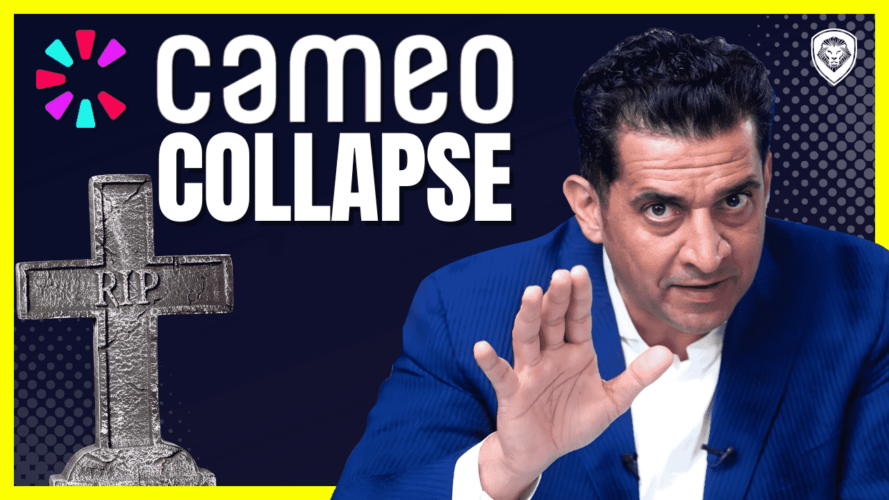In this video, Patrick Bet-David explains the fatal flaw in the business model of Cameo, a digital platform that allows users to pay famous people for personalized videos. This point of weakness caused its value to drop over 90 percent. Learn from their mistakes to avoid similar pitfalls in your own business strategy.
Cameo went from a startup with $0 in 2017 to a company estimated to be worth $1 billion. Everyone was talking about it: Kleiner Perkins led the Series B investing round which raised the company $50 million. SoftBank, a multinational investment holding company, partnered with Cameo, too. It hired 400 employees and recruited top celebrity users.
In 2021, Brian Baumgartner was making over $1,000,000 from the app, as was James Buckley. Comedian Gilbert was making nearly half a million dollars. Kevin O’Leary and Michael Rappaport were making about $300,000 each, and even the infamous Carole Baskin from Netflix’s Tiger King was pulling in $150,000.
Learn the benefits of becoming a Valuetainment Member and subscribe today!
Other major names on the app included Caitlyn Jenner, Snoop Dogg, Brett Favre, Lance Bass, Kenny G, Tony Hawk, and Ice T. They had over 50,000 personalities on their app at its peak.
Cameo stock went up over 400 percent. Their revenue went over $100,000,000.
Then, just a week ago, a tech journalist reported that Cameo’s market value dropped 90 percent after a failed funding round, and its employee count dwindled to just 33 people. Now, the company is only worth $100 million.
How did that happen?
Their business model succeeded under COVID, when people were stuck inside, lonely and willing to spend money.
In May 2022, Cameo CEO announced on Twitter that he had to fire 87 employees he did not want to fire. That’s 25 percent of its personnel.
Today has been a brutal day at the office. I made the painful decision to let go of 87 beloved members of the Cameo Fameo. If you’re looking to hire hungry, humble, smart, kind, curious, learning machines who love to win – and you see Cameo on their resume – look no further.
— Steven Galanis (@Mr312) May 4, 2022
What was happening in May 2022? The Federal Reserve was raising interest rates by half a percentage point to fight inflation, which was the steepest hike the country had seen in two decades.
Then came a failed venture into the NFT world. Then came a series of personality hires and fires that rubbed many the wrong way, and caused the market to sour on them.
Finally, their niche, which was once their strength, proved to be their weakness: the business model was so specific—paying celebrities to say happy birthday—that it could not justify repeat customers. Once you do it a handful of times, there is no reason to come back. Monthly users inevitably took a nose dive. Facebook initially was met with resistance (as are all new ideas) with people asking, “Why would I post all my photos online?” But eventually the reason behind the machine became clear, and it generated a loyal user base of repeat, even addicted, users.
A company or product cannot just be a “one night stand” in today’s market. In order to survive, you have to find a way to become permanently useful.
Our app, Minnect, allows users to connect with people for a purpose: to seek information, advice, expertise. Our app has a future, because there can never be an end to the acquisition of wisdom.
Sign up for a Minnect account and begin connecting with experts today
 Shane Devine is a writer covering politics, business, and culture for Valuetainment. Follow Shane’s work here.
Shane Devine is a writer covering politics, business, and culture for Valuetainment. Follow Shane’s work here.


















Add comment